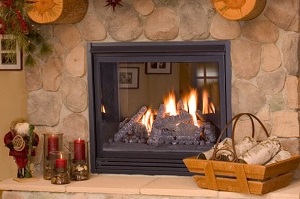Troubleshooting Tips for Gas Fireplaces – Part 2
 While gas fireplaces are popular because of their convenience, maintenance is still important. The following are troubleshooting tips for gas fireplaces, continued from Part 1 of this two-part series.
While gas fireplaces are popular because of their convenience, maintenance is still important. The following are troubleshooting tips for gas fireplaces, continued from Part 1 of this two-part series.
Fireplace Burner
If your pilot light is working but the main burner doesn’t turn on, the problem is probably the thermostat. This is a common issue that many homeowners overlook. Make sure the thermostat is on and that the current room temperature is below the thermostat setting.
There are fireplace burner issues that go beyond basic troubleshooting and require professional repair. Among the causes of problems with gas fireplace burners are:
- Wiring that is faulty, damaged, or unattached could be the cause of a burner that won’t light.
- If the pilot light orifice is dirty, contact our professionals to remove soot, dirt, and other contaminants. The orifice is where the flame emerges; and if it is dirty or obstructed, it won’t operate properly.
- The thermocoupler may need to be replaced. If you believe this part is malfunctioning, contact our service professionals, who can run a test that will identify whether this is the cause, which will prevent unnecessarily replacing it.
Strange Noises
There is usually no reason to be alarmed if your gas fireplace is making noises. Do some investigation, however, if you hear a new sound and experience an operating problem at the same time. Common causes of gas fireplace noises follow:
- A rumbling noise that occurs when the burners are on typically means that burners are dirty. Contact our chimney professionals to have your burners properly cleaned.
- If there is a roaring sound that occurs when the pilot light is on, it is usually because the flame needs to be adjusted.
- A grinding or shrieking noise is usually caused by a fan or blower. Not all gas fireplaces have this feature. Newer gas fireplaces with blowers are usually a lot quieter than a lot of older fan systems, which can sometimes be quite noisy.
Dirty Glass
It’s not unusual for the glass doors on gas fireplaces to develop a cloudy haze. The view of the flames is often diminished, and the fireplace loses its new appearance. Many homeowners are unaware that there is a cleaner made just for the fireplace doors. The solution for this issue is as simple as using special gas fireplace glass cleaner.
Unpleasant Odors
Your gas fireplace should never smell like gas, which is similar to the smell of sulfur. If you do smell gas, immediately call the fire department and your gas provider. There are other odors that you may smell with a gas fireplace, such as the following:
 If there are glass doors on your gas fireplace, it is possible that the doors are not sealed properly, which allows odors to escape into your home. Clips and glass fasteners need to be firmly in place.
If there are glass doors on your gas fireplace, it is possible that the doors are not sealed properly, which allows odors to escape into your home. Clips and glass fasteners need to be firmly in place.- Dirt, pet dander, and dust can get inside internal components and inside the burner, which creates odors. This usually only happens with ventless gas fireplaces.
- Objects that are placed on the mantelpiece or near the gas fireplace can emit odors when heated. If you decide that may be the cause of odors, remove one object at a time to see if the problem is solved.
It’s important to have your heating appliance installed by one of our chimney professionals, to ensure safe and proper operation. When installing a ventless gas fireplace, it’s especially important to follow manufacturer’s guidelines because if there is an odor, it could be because the appliance doesn’t get enough ventilation in the room.
Contact our chimney professionals today for an annual cleaning and inspection and for any questions you may have about your wood-burning or gas fireplace.
Northeastern Chimney, Inc
37 Cody Street, West Hartford, CT 06110
Phone: 860-233-5770


